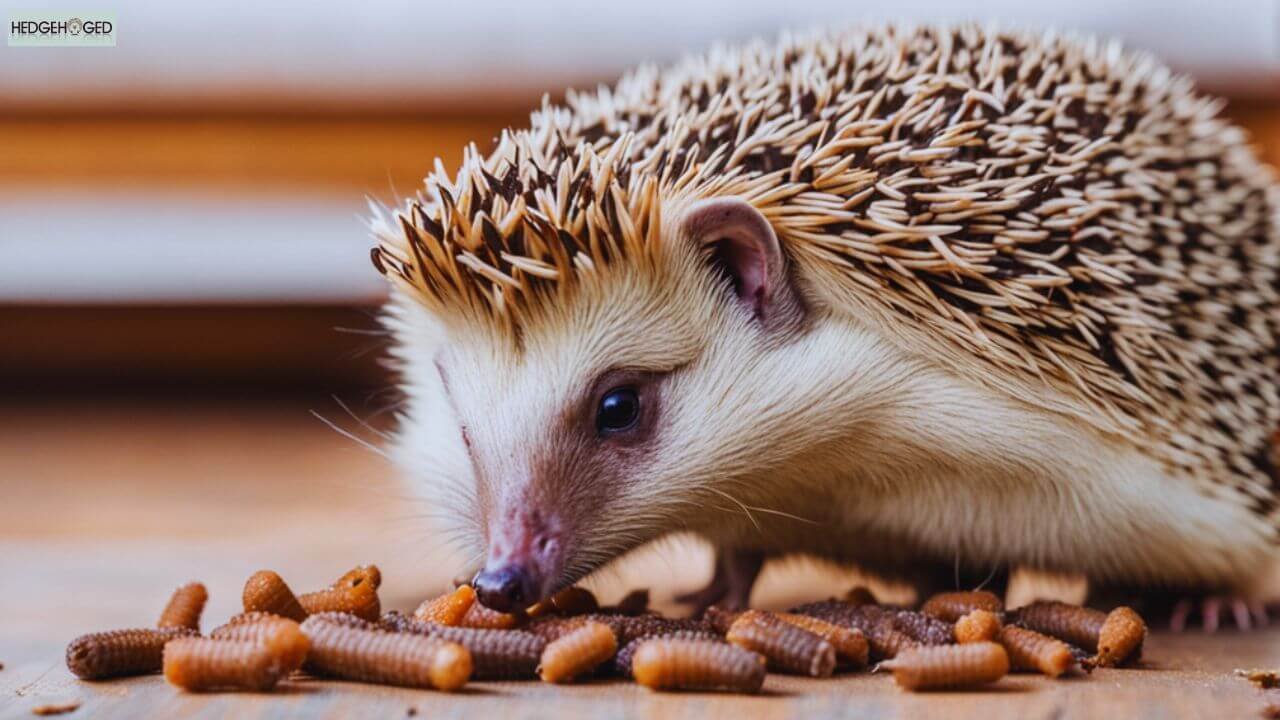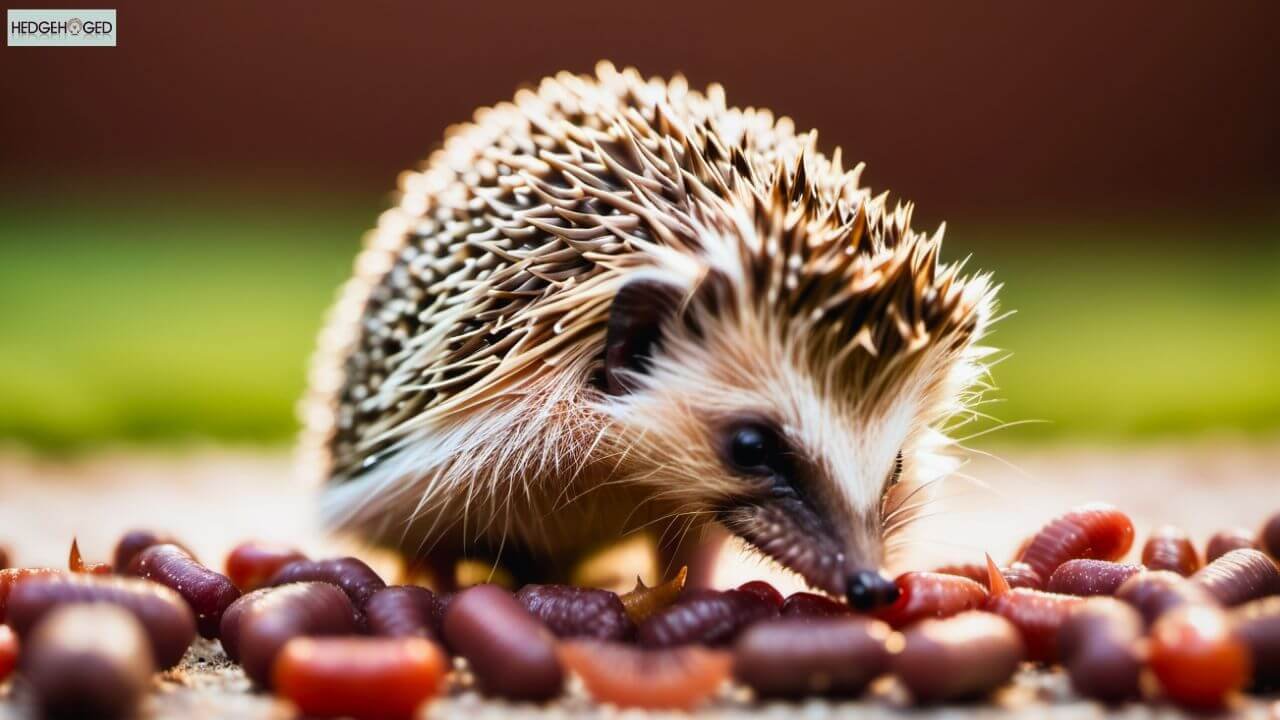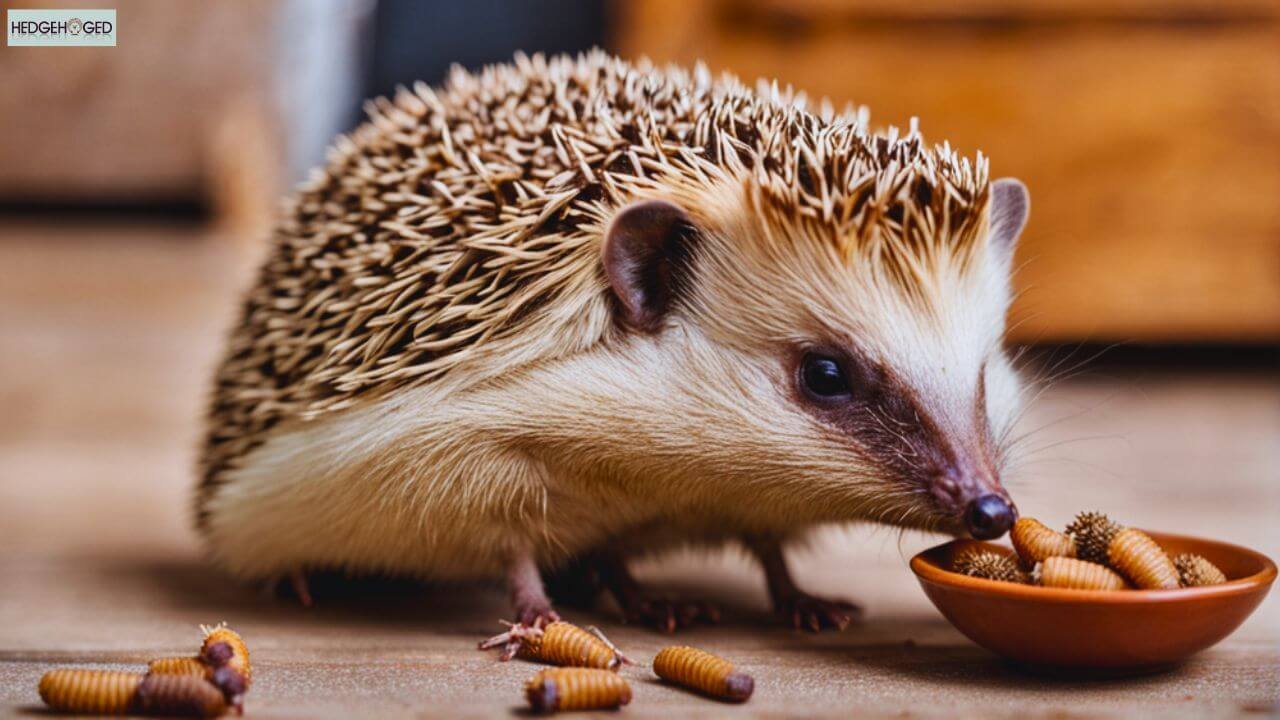Adorable hedgehogs enjoy eating a lot. Their favorite activity is this. Hedgehogs are prone to obesity because they are avid feeders who eat almost everything.
Naturally, not everything they eat is healthy for them. We’ll examine mealworms today and see “Can hedgehogs eat superworms.”
Yes, hedgehogs can eat superworms but only as a rare treat because they are extremely addictive and can have major negative health effects.
The kinds of insects that hedgehogs consume may pique the interest of certain individuals. Although superworms are edible to hedgehogs, you should treat your pet like a treat if you feed them superworms. Do you want to know more? Learn more about hedgehogs and superworms by reading on.
What Are Superworms?
Superworms, larvae of the darkling beetle, are widely used as food in the pet trade, particularly by those who keep reptiles. They are roughly five times bigger than mealworms and, because of their chitinous shell, have higher lipid, calcium, and fiber contents per pound.
There can be some confusion regarding mealworms and superworms because enormous mealworms are often mistaken for or sold as superworms at pet retailers. These mealworms are not distinct from ordinary mealworms; instead, they are larger and are protected from becoming beetles by the growth hormone.
What Do Hedgehogs Eat?
Due to their omnivorous nature, hedgehogs will consume both plant- and animal-based diets. Insects, spiders, slugs, fruits, nuts, flowers, leaves, roots, fungi, berries, and more have all been observed to be among their diet.
The majority of what they eat is plants (which makes sense). They do, however, eat certain animal products, such as fish, birds, mice, frogs, worms, snails, eggs, and even tiny mammals like voles and shrews.
Can Hedgehogs Eat Superworms?
As owners of hedgehogs, we want to ensure that our animals are eating a healthy, well-balanced diet. Even though they provide a wonderful complement to a hedgehog’s diet, it’s crucial to know which insects are okay to give them.
Superworms sometimes referred to as king worms or Zophobas morio, are a common food item for birds and reptiles. But, you should proceed with caution when handling hedgehogs.
Superworms can cause health issues like obesity and metabolic bone disease since they are high in fat and deficient in calcium. They also have a thick exoskeleton that hedgehogs may find challenging to consume.
Although some hedgehog owners give their pets superworms, we advise staying with safer alternatives like mealworms or crickets. These insects are a better option for hedgehogs since they contain more calcium and less fat.
In conclusion, superworms are a tempting food choice for hedgehogs, but you should think about their nutritional worth and possible health problems. To make sure your hedgehog is receiving all the nutrients they require, we advise talking to a veterinarian about their diet.
Is It Safe For Hedgehogs To Eat Superworms?
Yes, they are quite safe and nutritious. Superworms are just one species of darkling beetle. Their larvae are known as superworms.
Superworms appear menacing, of course. However, they don’t genuinely harm. Though they have small pincers, your hedgehogs are safe from them. It does not hurt all that much, even if they attack with their pincers.
They also supply mineral content and moisture. They are frequently taken as a dietary supplement and have a high calcium content. This makes them perfect for the pet industry’s large-scale commercial usage.
Are Superworms Healthy For Hedgehogs?
The largest feeding bug is called a super worm. Moreover, superworms are among the healthiest invertebrates you can feed your hedgehog companion.
Superworms offer your pet a wonderful balance of proteins, vitamins, and minerals, particularly calcium, vitamin A, and B-complexes, making them a good choice when it comes to nutrition. Our hedgehogs enjoy superworms as a healthy treat when given to them in moderation.
Nutritional Value of Superworms
There is some nutritional value to superworms, especially for hedgehogs that can break down the chitin in their exoskeletons. They have an extremely high phosphorus-to-calcium ratio, which can be harmful in large amounts, and their nutritional value is at best minimal.
Superworms are rich in the following nutrients:
| Nutrition | Percentage(%) |
|---|---|
| Moisture | 59% |
| Fat | 59% |
| Carbohydrate | 6% |
| Ash | 1% |
| Protein | 19% |
Protein, a necessary nutrient for hedgehogs, is present in superworms in good amounts. Every day, domestic hedgehogs require protein to support the growth, maintenance, and fortification of their muscles. Furthermore, the body’s other organs depend on protein to function correctly.
Superworms are low in fat and high in protein. For a hedgehog to survive, protein is vital. Proteins aid in tissue healing, muscle growth, and the production of digestive enzymes. Superworms are also a great way to stay hydrated.
Superworms are a fantastic source of water for hedgehogs because they are over 50% moisture. For hedgehogs to avoid dehydration, diarrhea, intestinal impaction, and other health problems, they must drink enough water.
Why Should You Feed Hedgehog Insects?
We are omnivores and hedgehogs. This indicates that they consume both plant- and animal-based diets. Hedgehogs have particular dietary needs as a result. Hedgehogs need a wide range of food kinds. Hedgehogs get their fiber from plants like grasses and leaves, which is necessary for maintaining the health of their digestive tracts.
Chitin, the outer layer of armor on some worms like superworms and insects like crickets, is one of the key advantages of feeding insects to hedgehogs. Your hedgehog will benefit from this chitinous layer’s abundance of protein and fiber, which will aid in better digestion.
To power their lifestyles, they also require carbs, which are found in fruits and vegetables. Last but not least, hedgehogs require proteins to grow robust and healthy. Mice and voles, as well as insects, are the sources of these proteins! Your hedgehog will receive a nutritional boost and assurance that he obtains all the nutrients he needs if you feed him insects.
Types of Superworms For Hedgehogs
Your hedgehog will enjoy a variety of insects in addition to their regular diet, such as:
- Superworms
- Mealworms
- Waxworms
- Crickets
- Phoenix worms
- Dubia Roaches
- Hornworms
- Silkworms
Can Hedgehog Babies Consume Superworms?
Superworms can be consumed by baby hedgehogs, but it’s preferable to steer clear of them as much as you can. Superworms are too large for hedgehog pupae. Moreover, superworms, which can reach lengths of 3–4 inches, can injure young hedgehogs.
Feeding tiny insects to a pet’s newborn hedgehog is the best course of action. Furthermore, superworms contain too much fat for young hedgehogs. The fats could make them overweight and hinder their healthy growth.
Risks of Feeding Superworms
Superworms are not our hedgehogs’ best meal option. Superworm overconsumption can lead to serious health issues. Some health risks that your hedgehogs may experience if you overfeed them superworms are listed below:
Fat Content
Superworms have a fair quantity of fat, which our hedgehogs may find problematic. It is crucial to restrict the use of superworms to our hedgehogs as a result. Superworm overindulgence can easily lead to obesity in our children.
Hedgehogs May Become Dependent On The Superworms:
It may sound absurd, but hedgehogs may indeed get quite dependent on superworms. Hedgehogs can become addicted to worms, just like people can become addicted to fast food.
Potential Risks
Another potential risk is that superworms can carry parasites or bacteria that can be harmful to hedgehogs. Superworms should be bought from a reliable supplier and should be thoroughly cleaned and prepared before being fed to your hedgehog.
Superworms can generally be a nutrient-dense supplement to a hedgehog’s diet, but before giving them to your pet, it’s vital to weigh the hazards against the benefits. A veterinarian should always be consulted before making any dietary adjustments for your hedgehog.
Alternatives to Superworms
Because hedgehogs have particular nutritional requirements, you must be aware of what other foods they enjoy.
Consider the following options:
Mealworms: These high-protein treats are available online or at pet supply stores.
Insects: Hedgehogs enjoy nibbling on insects such as grasshoppers, beetles, and crickets. Simply keep them free of pesticides.
Fruits and Vegetables: Add a few pieces of peas, apples, bananas, and carrots to make things interesting.
Cooked turkey or chicken: Reward your hedgehog sometimes with some cooked lean proteins.
Hard-boiled eggs: Hard-boiled eggs (with no shell) are a great way to give your hedgehog a balanced balance of fat and protein.
Garden bugs: Don’t use pesticides and leave things natural; instead, let your hedgehog hunt bugs in flower beds and gardens. When feeding hedgehogs, you have to be mindful of portion sizes and make sure they eat a balanced diet.
How To Feed Superworms To Hedgehogs?
It’s crucial to give our hedgehogs the superworms in the right way. Before giving our hedgehogs super worms, there are a few things we need to take care of to ensure the process is safe:
- The portion is the first thing you should think about. Our hedgehogs should only be given superworms as treats. Superworm overconsumption might result in serious health issues. Kibble should be the main source of nutrition for your hedgehog, with insects or worms coming in second.
- Additionally, you should only ever give your hedgehogs brand-new superworms. Serve them without any live superworms, though.
- You can break the superworms in half to make them simpler for your hedgehogs to eat if they are too big for them to swallow.
- It is now advised to give your pet the worms in their food dish. You have the option to feed them by hand, though. You have the option.
- The worms can be served alongside your hedgehog’s food. This will guarantee that your pets receive all of the necessary nutrition. But please, try not to overfeed them in one sitting.
- The final step is to take the worm’s uneaten portion out of your hedgehog’s cage. It’s crucial to do this to deter flies.
How Many Superworms Should A Hedgehog Eat?
Superworms should only be given as treats to hedgehogs. It cannot be a regular part of your pet’s diet. Superworms can easily cause our hedgehogs to become obese because they contain a fair amount of fat.
Superworms are also high in protein, which occasionally causes issues for our hedgehogs. Therefore, the best option for the hedgehogs is to feed them 1-2 superworms at a time.
It would also be ideal if you fed your hedgehogs superworms according to their age. For instance, you can provide tiny worms to baby hedgehogs.
How Often Can Hedgehogs Eat Superworms?
The most important consideration when determining how often to serve your hedgehog is its age. But generally speaking, hedgehogs do best with 1-2 super worms once or twice weekly.
Superworms should only be offered in moderation as they can lead to additional issues such as diarrhea, constipation, and vomiting. They should not be used as a regular food. You should also refrain from giving baby hedgehogs superworms.
FAQs
Can hedgehogs eat superworms?
Yes, hedgehogs can eat superworms, but they should be given as occasional treats due to their addictive nature and the potential health risks associated with overconsumption.
Are superworms safe for hedgehogs?
While super worms can be safe and nutritious for hedgehogs when fed in moderation, it’s essential to consider their high fat content and potential digestive challenges.
How many superworms should hedgehogs eat?
Hedgehogs should only be given 1-2 superworms as treats once or twice a week to prevent obesity and other health issues.
What are the nutritional values of superworms?
Superworms contain high levels of moisture, fat, protein, carbohydrates, and ash. While they offer some nutritional value, their high fat content should be considered when feeding them to hedgehogs.
Can hedgehog babies consume superworms?
It’s best to avoid feeding super worms to baby hedgehogs due to their high-fat content and potential choking hazards. Instead, opt for smaller insects suitable for their size and age.
Conclusion
In conclusion, can hedgehogs eat superworms? Superworms are a food source for hedgehogs and can give your pet excellent nourishment. However, because of their high fat content, they shouldn’t be provided in place of your hedgehog’s regular food. Superworms should generally only be given as an occasional treat to your hedgehog. Moderation is the key when feeding any insect or worm to your hedgehog.




